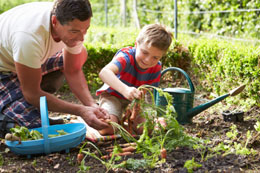Vegetable gardening, when planned well, could give a good yield. Here, we have given some tips for vegetable gardening that will help you grow veggies, right in your own backyard.

Gardening as a hobby or leisure activity helps in relieving stress. It helps to clear one's mind after a hectic work schedule. If you have a small backyard or a front yard, you could grow a vegetable garden or even a flower garden. In a vegetable garden, you can grow seasonal vegetables and fruits. It is an excellent idea to harvest your own vegetables when food prices are soaring. When you have your own vegetable garden, you can also be sure of the quality of the vegetables and ensure that they are organic.
Tips for Vegetable Gardening
The first and foremost thing you need to do is to landscape or design your garden to practice crop rotation. Crop rotation will ensure prevention of infectious diseases that may spread from one plant to anothe. You can plan which vegetables you want to plant. If you are an amateur, you could always get the help of a professional.
Once you have decided to develop a vegetable garden, till the soil, remove the weeds, add natural manure, and till again. Wet the vegetable patch for several weeks and till the patch again before planting the saplings. This process helps inhibit the growth of weeds.
It is not possible to have a continuous year-round supply of the same vegetables due to seasonal variations. However, if you want to harvest the same type of vegetable for a long period, practice interval planting. This means that you will sow the seeds/saplings of a particular type of vegetable in batches (ten saplings every ten days). This way the vegetables mature at different times and you have a continuous supply for a longer period of time. Consult a professional to learn which plants can be used as interval crops in your area.
If your backyard is spacious, opt for group cropping by dividing the garden into blocks. This way you could plant vegetables of similar varieties and have almost the same harvest dates. Else you could plant two or more varieties of vegetables that have different harvest dates to prolong the season of any one vegetable.
One oft-forgotten rule is to not grow large batches of a vegetable that cannot be stored for long and has to be consumed immediately.
If you have grown saplings of any vegetable in a different patch and you now want to shift them, ensure that you transplant only the best saplings (ones that are disease-free, stocky and strong). Please avoid saplings that are "leggy" and weak.
If you buy saplings from a nursery, select ones that are free of insect damage and are healthy.
Once the saplings are transplanted, ensure that you water the saplings with water-soluble "starter fertilizer". You could purchase the fertilizer from a nursery. Mix two tablespoons of water-soluble fertilizer with one gallon of water. The transplanted saplings need to be drenched with a cup of this solution on alternate days. Remember to water the base of the transplants regularly.
Vegetable gardening is a hobby for some, while it is a livelihood for others. Whether it is a hobby or a profession, the gardener has to resist the temptation to plant too many plants. Keep your garden weed free and irrigate it everyday.






 Gardening as a hobby or leisure activity helps in relieving stress. It helps to clear one's mind after a hectic work schedule. If you have a small backyard or a front yard, you could grow a vegetable garden or even a flower garden. In a vegetable garden, you can grow seasonal vegetables and fruits. It is an excellent idea to harvest your own vegetables when food prices are soaring. When you have your own vegetable garden, you can also be sure of the quality of the vegetables and ensure that they are organic.
Gardening as a hobby or leisure activity helps in relieving stress. It helps to clear one's mind after a hectic work schedule. If you have a small backyard or a front yard, you could grow a vegetable garden or even a flower garden. In a vegetable garden, you can grow seasonal vegetables and fruits. It is an excellent idea to harvest your own vegetables when food prices are soaring. When you have your own vegetable garden, you can also be sure of the quality of the vegetables and ensure that they are organic.